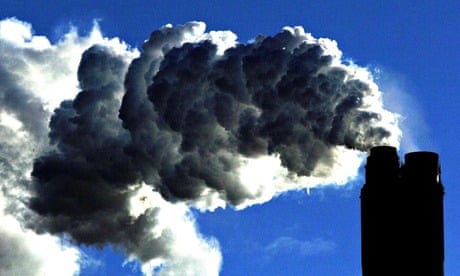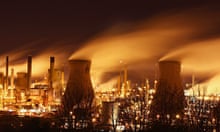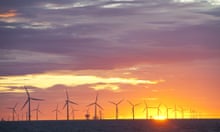The world is heating up under the pressure of rising greenhouse gas emissions, and the consequences will be dire: an increase in extreme weather, droughts, floods, a loss of agricultural productivity, people living precarious lives pushed closer to the brink. But it does not have to be so. Halting the rise of carbon emissions is possible – not only possible, but achievable at a modest cost that will be more than outweighed by the manifest benefits. We spend a little more now, to recoup in the next few decades in the form of breathable air, drinkable water and an atmosphere that doesn't cook us.
Sounds familiar? The New Climate Economy report, co-authored by Nicholas Stern, is published on Tuesday but it echoes the warnings first set out in stark terms in his landmark review of the economics of climate change in 2006. Then, his findings were revolutionary. Naysayers had argued that climate change was just too big a problem, too expensive to solve, requiring as it does an overhaul of the world's energy systems and economy. Stern proved – in language that economists can understand – that it could be done, that dealing with climate change need not cost the earth.
Today, the data is clearer than ever and the New Climate Economy report, endorsed by a roll-call of the world's major institutions including the World Bank, the OECD and the IMF, spells it out. If we want economic growth, we can have it – while reducing greenhouse gas emissions and building a new economy that brings a better quality of life for all, and most of all to those living in developing countries where the great majority of future population growth will be. But we can only achieve all of these goals together if we grasp the opportunity within the next 15 years. If we wait any longer, the window will close and we will be doomed to an ever-heating planet and an illusion of growth that in fact impoverishes us all.
The first comprehensive study bringing together all of the world's knowledge on climate change came in 1988, with the inaugural report by the Intergovernmental Panel on Climate Change. It concluded that global warming was probably the result of human activities but more scientific research was needed. In the intervening decades, that research has been done and the results are clear. The fifth IPCC report, published in stages from last year to this autumn, sets out clearly the "human fingerprint" on the climate change that is happening, and is projected to get worse.
With all of that scientific knowledge has come technological innovation. Wind turbines were an expensive novelty in the 1980s. Today, several generations of the technology later, they can compete with fossil fuels in generation capacity and on cost. Solar panels have dropped in cost so rapidly that they are economically viable without subsidy in many regions, even those not blessed with constant sunshine. Even fossil fuel-burning power plants have become more efficient, and electric cars provide an alternative to gas-guzzlers, while better building design and more advanced electrical equipment mean we can enjoy modern facilities without rising emissions.
All of these innovations are available for us to use here and now, not decades in the future. Yet still we are building fossil fuel power plants, exploring for gas that is ever harder and more expensive to find, steaming oil from tar sands. We do so – companies do so on our behalf – because it still, more than 20 years after the world vowed in 1992 to "avoid dangerous climate change", makes economic sense to burn carbon.
As this report underlines, we know what we need to do. We have known it for years. What is stopping us?








Comments (…)
Sign in or create your Guardian account to join the discussion